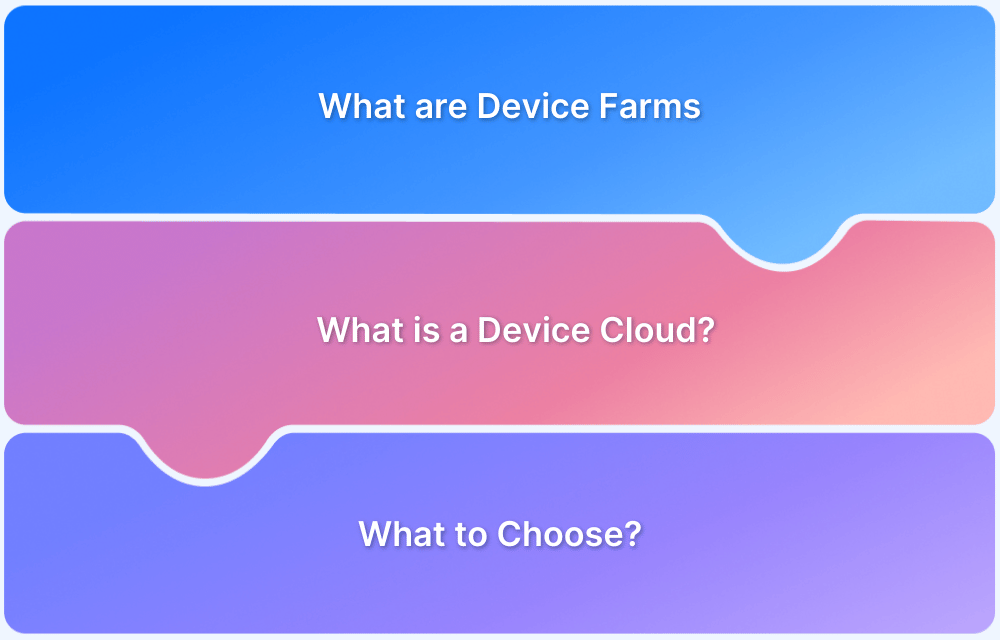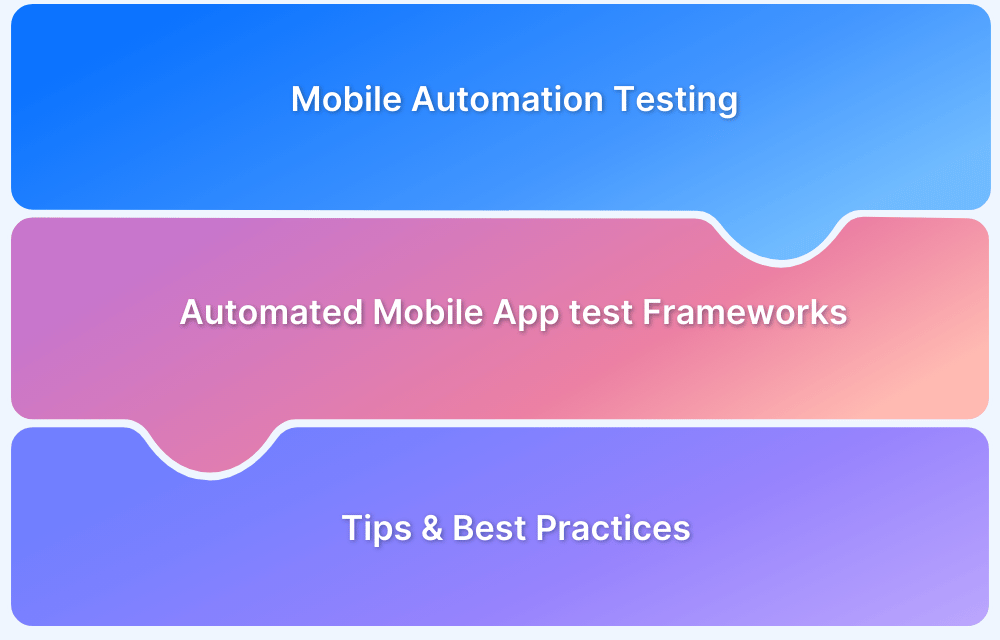Mobile app testing requires access to a wide range of real devices to ensure compatibility and performance across different operating systems, screen sizes, and hardware configurations.
AWS Device Farm is a popular choice for testing mobile and web apps on real devices, but it isn’t the only option, and for some teams, it’s not the best fit. Whether you’re looking for better performance, a more intuitive interface, or more flexible pricing, several powerful alternatives are available.
Overview
While AWS Device Farm offers robust testing on real devices, many teams seek alternatives for greater flexibility, faster execution, and better integration with their existing workflows.
Top alternatives to AWS Device Farm include:
- BrowserStack: Cloud-based testing on 3500+ real device and browser combinations with support for automated and manual testing.
- TestGrid: End-to-end testing platform offering on-prem, private, and cloud device lab options.
- Calabash: Open-source framework for automated acceptance testing of mobile apps using Cucumber.
- Ranorex Studio: Comprehensive test automation tool with a user-friendly UI for desktop, web, and mobile testing.
- Appium: Open-source automation tool for native, hybrid, and mobile web apps with cross-platform support.
- Detox: Gray box end-to-end testing framework for mobile apps built with React Native.
- Testdroid: Cloud-based mobile app testing platform offering real device testing and CI/CD integration.
This comprehensive guide explores the best alternatives to AWS Device Farm, their features, and how to choose the right platform for your testing requirements.
What is AWS Device Farm?
AWS Device Farm is Amazon’s cloud-based testing service that allows developers to test their Android, iOS, and web applications on real phones and tablets hosted in Amazon’s data centers. The service supports automated tests using frameworks like Appium, Espresso, and XCTest, as well as remote manual testing.
Key features of AWS Device Farm include:
- Access to a wide selection of physical Android and iOS devices
- Support for automated testing frameworks
- Manual testing capabilities with remote device access
- Integration with AWS services
- Pay-as-you-go pricing model
Despite these strengths, AWS Device Farm has limitations that have prompted many development teams to explore alternatives. These include limited device availability in certain regions, pricing concerns, and integration challenges with non-AWS workflows.
Quick Overview of the Alternative to AWS Device Farm
Here’s a quick overview of the leading alternatives to AWS Device Farm:
| BrowserStack Best for cross-platform testing at scale using real devices and browsers in the cloud. Ideal for teams needing wide device coverage, seamless CI/CD integration, and secure local testing support. |
| TestGrid Well-suited for hybrid cloud deployment and on-premise device lab setups. Great choice for enterprises needing full control over infrastructure, including support for manual, automated, and low-code testing. |
| Calabash Tailored for behavior-driven development (BDD) of mobile apps using Cucumber. Most useful for teams that prioritize readable, business-facing test scenarios on Android and iOS. |
| Ranorex Studio Optimized for desktop and mobile test automation with a strong UI element recognition engine. Ideal for teams looking for a codeless interface combined with advanced scripting capabilities. |
| Appium Best for open-source, cross-platform mobile automation using a single codebase. Popular among QA teams that want flexibility, community support, and extensive language compatibility. |
| Detox Specialized for end-to-end testing of React Native apps. Perfect for developers seeking fast, reliable tests tightly integrated into the app’s lifecycle and JS stack. |
| Testdroid (Bitbar) Suited for high-scale parallel testing across a wide range of devices. Offers flexibility with both public cloud and private device cloud options. Ideal for performance and compatibility testing across Android and iOS. |
Top Alternatives to AWS Device Farm
Here are the top alternatives to AWS Device Farm:
BrowserStack
BrowserStack stands as a market leader in cloud-based testing platforms, offering access to over 3500+ real mobile devices and browsers for manual and automated testing.
What sets BrowserStack apart is its comprehensive infrastructure of physical device farms distributed across global data centers, ensuring authentic testing environments that accurately reflect real-world conditions.
The platform’s Automate product enables sophisticated test automation with enhanced capabilities beyond basic Selenium and Appium implementations. This includes visual regression testing, network throttling simulation, and advanced debugging tools that provide video recordings, console logs, and network traffic analysis when tests fail. BrowserStack’s
Local Testing feature creates secure, encrypted connections between their cloud and internal development environments, allowing testing of applications that aren’t publicly accessible while maintaining strict security protocols.
Features:
- Extensive real device cloud with the latest iOS and Android devices
- Live, interactive testing capabilities
- Automated testing through Automate
- Screenshot testing for quick visual verification
- Local testing for secure, internal development environments
- Native app testing with App Automate
- Seamless integration with CI/CD tools like Jenkins, Travis CI, and GitHub Actions
- Comprehensive debugging tools, including video recordings, logs, and network information
- Geolocation testing across multiple countries
TestGrid
TestGrid has carved out a position in the testing market with its AI-driven approach to test automation. The platform’s core innovation is its self-healing test scripts, which use machine learning algorithms to adapt to application changes.
The platform employs a scriptless test creation system that combines record-and-playback functionality with computer vision technologies. This hybrid approach overcomes many limitations of traditional record-and-playback systems by recognizing visual elements even when underlying code changes.
TestGrid also includes an integrated test management system with customizable workflows that align with various development methodologies. However, this can create integration challenges for organizations already committed to existing test management solutions.
Features:
- AI-based test automation
- Scriptless test creation
- Built-in test management
- Parallel testing capabilities
- Support for web and mobile applications
- Integration with popular CI/CD tools
Drawbacks:
- Smaller device lab compared to BrowserStack
- Less comprehensive documentation
- Limited community support
Read More: Manual Testing vs Automation Testing
Calabash
Calabash is an open-source mobile testing framework that pioneered behavior-driven development (BDD) for mobile applications. Originally developed by Xamarin (later acquired by Microsoft), it bridges Cucumber’s human-readable test specifications with native testing frameworks, UI Automation for iOS, and Robotium for Android.
The framework’s implementation of the Gherkin syntax (Given-When-Then) creates self-documenting tests that serve as both executable specifications and living documentation. This approach can significantly enhance understanding of application behavior across organizational roles.
Calabash’s underlying Ruby implementation provides considerable flexibility through metaprogramming capabilities, enabling advanced users to create domain-specific testing languages tailored to particular applications. However, this same Ruby foundation creates barriers for teams without Ruby expertise.
Features:
- Open-source and free to use
- Uses natural language specifications with Cucumber
- Cross-platform support
- Strong community support
Drawbacks:
- Development was officially discontinued, though the community maintains it
- Ruby-based, requiring specific programming expertise
- No built-in device cloud (requires integration with other services)
- Steeper learning curve for non-Ruby developers
Read More: Top 20 UI Automation Testing Tools
Ranorex Studio
This platform distinguishes itself through its sophisticated approach to codeless test automation with a comprehensive object repository system that captures deep hierarchical relationships between UI elements.
This repository-based architecture enables tests to maintain resilience against UI changes by employing multiple fallback identification strategies when application interfaces are updated.
The platform implements object recognition technology that uses weighted property matching to identify changed elements. It evaluates multiple properties simultaneously, including structural position, neighboring elements, and fuzzy text matching.
Ranorex’s modular test design philosophy separates test actions, test data, and validation points, enabling reusability of test components across different scenarios and potentially reducing the total code needed for comprehensive test coverage compared to script-based approaches.
Features:
- Codeless test automation
- Robust object recognition
- Cross-browser and cross-device testing
- Reusable test modules
- Detailed reporting
Drawbacks:
- Windows-only for test development
- Higher pricing for enterprise features
- No built-in device cloud (partners with other providers)
- Limited support for certain mobile testing scenarios
Appium
Appium has established itself as the standard for cross-platform mobile test automation by extending the WebDriver protocol to control native, hybrid, and mobile web applications. This architectural approach delivers significant benefits for cross-platform teams by maintaining the same API across both iOS and Android.
The framework’s implementation leverages platform-native testing frameworks, XCUITest for iOS and UiAutomator/Espresso for Android, while abstracting the differences behind a consistent API.
Appium’s compatibility with multiple programming languages (Java, Python, JavaScript, Ruby, C#, and more) provides exceptional flexibility for organizations with diverse technology stacks. This allows teams to implement test automation using existing expertise rather than requiring specialized skills in new languages.
Features:
- Open-source and free to use
- Cross-platform (same API for iOS and Android)
- Uses standard WebDriver protocol
- Language-agnostic (supports Java, Python, JavaScript, Ruby, etc.)
- No modification of app required for testing
Drawbacks:
- No built-in device cloud (requires integration with services like BrowserStack)
- Setup complexity can be challenging
- Test execution can be slower compared to native testing frameworks
- Requires development expertise to implement effectively
Read More: Appium vs XCUITest : Key Differences
Detox
Detox is a specialized testing framework focused exclusively on React Native applications. Its unique synchronization mechanism directly taps into React Native’s internal event loop. This gray-box approach virtually eliminates flaky tests caused by timing issues.
The framework places test execution inside the application process rather than controlling it externally, delivering substantial performance improvements with tests typically running 3-5 times faster than equivalent Appium tests.
Detox implements a dual-abstraction model that provides both high-level, intention-based commands and low-level access to native automation capabilities when needed, supporting both rapid test development and sophisticated testing scenarios.
Features:
- Built specifically for React Native
- Fast test execution
- Gray box testing approach
- Runs tests inside the actual application
- Synchronizes automatically with the app’s operations
Drawbacks:
- Limited to React Native applications
- Relatively young framework with evolving documentation
- Smaller community compared to established frameworks
- No built-in device cloud
Read More: End to End Detox Testing Tutorial
Testdroid (Now Bitbar)
Bitbar (formerly Testdroid) is an enterprise-focused testing platform with distinctive strengths in security, scalability, and compliance. The platform offers both cloud and on-premises deployment options, with the latter providing complete data isolation for organizations in highly regulated industries like finance, healthcare, and government.
Bitbar’s testing infrastructure implements a dynamic allocation system that optimizes device utilization based on current load, test priority, and device characteristics, supporting thousands of concurrent test executions.
The platform includes advanced security features beyond typical testing solutions, including application binary verification, secure device wiping between tests, and comprehensive audit logging to help organizations maintain compliance with frameworks like SOC 2, HIPAA, and GDPR.
Features:
- Private cloud options for security-conscious enterprises
- High parallelization capabilities
- Support for various testing frameworks
- Strong enterprise security features
- Comprehensive test analytics
Drawbacks:
- Complex pricing structure
- Steeper learning curve
- User interface less intuitive than some competitors
- Documentation can be challenging to navigate
Read More: 20 Best Automation Testing Tools for Cloud
Quick Comparison Table
| Feature | BrowserStack | TestGrid | Calabash | Ranorex | Appium | Detox | Bitbar |
|---|---|---|---|---|---|---|---|
| Device Coverage | 3,500+ real devices, including regional variants | Hybrid cloud/on-premise, large device pool | Limited to mobile, BDD-focused | Mobile, web, desktop support | Cross-platform mobile (Android/iOS) | Focused on React Native apps | Wide range of devices, public & private cloud |
| CI/CD Integration | Supports major CI/CD tools (Jenkins, CircleCI, GitHub Actions, Azure DevOps, and more) | Strong CI/CD support | Requires custom integration | Supports various CI/CD tools | Supports Jenkins, Bamboo, GitHub Actions | Works with CI/CD via plugins | CI/CD integrations for automation |
| Debugging Tools | Video recordings, logs, network traffic, visual diffs | Basic logs and reports | Basic logging, no advanced debugging | Strong UI object recognition, basic debugging | Logs, screenshots, device interaction | Real-time app-level debugging | Advanced logs, screenshots, device interaction |
| Security Features | Secure local testing, encryption | Secure tunneling, hybrid cloud options | Limited security features | Strong security, enterprise setups | Depends on cloud setup | App-level security features | Secure cloud and private cloud options |
| Enterprise Support | SSO, device allocation, team management | Custom enterprise solutions | No enterprise support | Enterprise features, SSO | Open-source, basic enterprise features | Best for small to mid-sized teams | Private cloud options for enterprises |
| Pricing Model | Subscription-based | Custom pricing | Open-source, deprecated | Commercial license | Open-source | Open-source | Subscription, usage-based |
| Geographic Testing | Yes | Limited | No | No | No | No | Yes |
Why look for Alternatives to AWS Device Farm?
Development teams explore alternatives to AWS Device Farm for several compelling reasons that impact testing efficiency and effectiveness.
- Limited Device Selection: While AWS Device Farm offers a wide range of devices, it often lacks newer models and region-specific variants. This makes it difficult for teams targeting global markets to test on devices with different hardware setups or pre-installed software, which can affect app behavior.
- Regional Availability: Device farm’s infrastructure is not evenly spread across all regions, leading to high latency and longer queue times in certain locations. This can disrupt CI workflows that rely on consistent and timely test execution.
- Pricing Structure: Its per-minute billing model can lead to unpredictable costs, especially during high testing loads in pre-release phases. Tests that run longer than expected can significantly increase expenses.
- Integration Complexity: Setting up integrations often requires deep AWS knowledge, including IAM configurations and service-specific setups. This makes it challenging for teams not fully invested in the AWS ecosystem.
- Performance Consistency Issues: Test execution times can vary widely, even for the same test suite. These inconsistencies make it harder to maintain a reliable CI/CD pipeline, timing, and can delay releases.
- Limited Debugging Tools: Beyond basic logs and screenshots, AWS Device Farm lacks advanced debugging features like network traffic inspection and memory profiling. This slows down issue resolution compared to platforms with more robust tools.
Criteria for Choosing an AWS Device Farm Alternative
When evaluating alternatives to AWS Device Farm, organizations should assess both technical and operational factors aligned with their specific testing requirements.
- Device Coverage: Evaluate whether the platform supports the exact device profiles your app targets, including regional variants, carrier-specific models, and older devices. Check how quickly new flagship devices are added; top platforms typically offer them within weeks of release.
- Testing Framework Support: Look beyond basic compatibility and assess the depth of support for your testing frameworks. Consider whether advanced features like custom desired capabilities, plugins, and specialized assertion libraries are supported, and how promptly new framework versions are adopted.
- Integration Capabilities: Assess the quality of documentation, availability of pre-built CI/CD integrations, and authentication options. Strong integrations should support conditional testing, parallel execution, and detailed reporting within your existing development tools.
- Debugging Tools: Examine the range and depth of diagnostics available, such as video recordings, network traffic capture, console logs, and memory snapshots. Effective platforms help identify the root causes of failures, not just report that they occurred.
- Security Features: Check for secure device wiping between sessions, encrypted data transmission, strict access controls, and industry certifications. For sensitive data, consider platforms that offer private device clouds or on-premises solutions for full data isolation.
- Pricing Model: Evaluate whether the pricing is transparent and aligns with your usage patterns. Watch for hidden fees (e.g., for debugging tools or test recordings), and explore options for committed-use discounts to optimize long-term costs.
Why Choose BrowserStack?
Among the alternatives to AWS Device Farm, BrowserStack distinguishes itself with several compelling advantages for organizations seeking comprehensive mobile testing solutions.
- Unmatched Device Coverage: BrowserStack provides access to over 3500+ real devices, covering everything from the latest flagship models to legacy devices. It supports region-specific variants often unavailable elsewhere and rapidly adds new devices within days of their release, ensuring timely testing across the fragmented mobile ecosystem.
- Robust CI/CD Integrations: BrowserStack offers native integrations with major CI/CD tools like Jenkins, CircleCI, GitHub Actions, and Azure DevOps. These enable seamless integration into automated pipelines, allowing teams to trigger tests on code commits, generate reports, and maintain visibility within their existing development dashboards.
- Advanced Debugging Capabilities: BrowserStack captures detailed logs, including video recordings, console output, network traffic, and screenshots. These tools help teams quickly identify the root cause of test failures and streamline issue resolution.
- Secure Local Testing: BrowserStack’s Local Testing feature allows teams to test internal development environments securely via encrypted tunnels. This is particularly valuable for organizations with strict security requirements or behind-firewall applications.
- Enterprise-Ready Features: Designed for large-scale teams, BrowserStack offers dedicated device allocation, role-based access controls, and SSO integration with corporate identity systems. These features support efficient team management and ensure reliable testing availability during critical release cycles.
Conclusion
The mobile testing landscape offers strong alternatives to AWS Device Farm, each tailored to different needs. While AWS Device Farm suits teams already within the AWS ecosystem, other platforms offer superior device coverage, debugging, and integration flexibility.
BrowserStack stands out as a comprehensive enterprise-grade solution, while tools like Detox serve teams focused on specific frameworks like React Native. The best choice depends on your team’s unique testing needs, including device diversity, framework support, CI/CD integration, and security compliance.
As mobile technologies evolve, choosing the right testing platform is key to delivering reliable, high-quality user experiences at scale.






